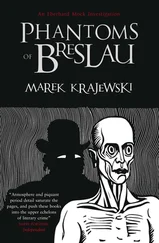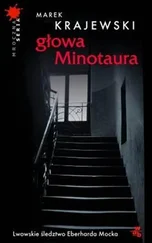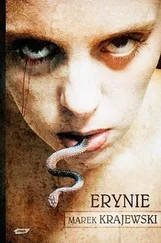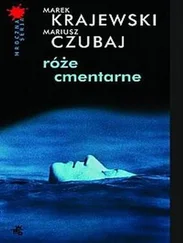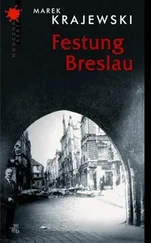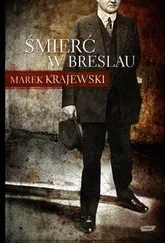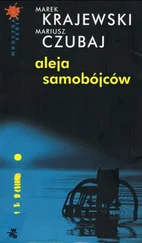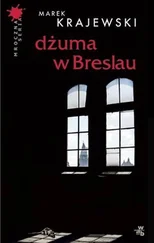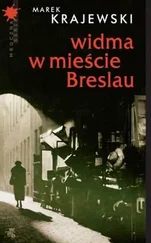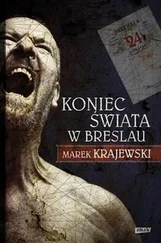Marek Krajewski - Death in Breslau
Здесь есть возможность читать онлайн «Marek Krajewski - Death in Breslau» весь текст электронной книги совершенно бесплатно (целиком полную версию без сокращений). В некоторых случаях можно слушать аудио, скачать через торрент в формате fb2 и присутствует краткое содержание. Жанр: Полицейский детектив, на английском языке. Описание произведения, (предисловие) а так же отзывы посетителей доступны на портале библиотеки ЛибКат.
- Название:Death in Breslau
- Автор:
- Жанр:
- Год:неизвестен
- ISBN:нет данных
- Рейтинг книги:3 / 5. Голосов: 1
-
Избранное:Добавить в избранное
- Отзывы:
-
Ваша оценка:
- 60
- 1
- 2
- 3
- 4
- 5
Death in Breslau: краткое содержание, описание и аннотация
Предлагаем к чтению аннотацию, описание, краткое содержание или предисловие (зависит от того, что написал сам автор книги «Death in Breslau»). Если вы не нашли необходимую информацию о книге — напишите в комментариях, мы постараемся отыскать её.
Death in Breslau — читать онлайн бесплатно полную книгу (весь текст) целиком
Ниже представлен текст книги, разбитый по страницам. Система сохранения места последней прочитанной страницы, позволяет с удобством читать онлайн бесплатно книгу «Death in Breslau», без необходимости каждый раз заново искать на чём Вы остановились. Поставьте закладку, и сможете в любой момент перейти на страницу, на которой закончили чтение.
Интервал:
Закладка:
The Criminal Counsellor was in a difficult situation. For several months now, he had observed worrying changes in the police. He knew that one of his best policemen, the Jew Heinz Kleinfeld, was regarded with disdain by many; one policeman, newly engaged by the Criminal Department, had refused outright to work with Kleinfeld, with the result that — from one day to the next — he had stopped working for the police. But that was at the beginning of January. Now Mock was not at all sure he would have thrown that Nazi out of work. Much had changed since then. On January 31st, the posts of Minister of Internal Affairs and Chief of the entire Prussian Police were taken by Hermann Goring; a month later, the new, brown-shirt Oberprasident of Silesia, Helmuth Bruckner, had moved into the impressive building of the Regierungsbezirk Breslau on Lessingplatz; and not quite two months later, the new President — shrouded in ill-repute — Edmund Heines had marched into the Police Praesidium of Breslau. A new order had come to pass. The old camp for French prisoners of war on Strehlener Chaussee in Durrgoy had been turned into a concentration camp where the first to find themselves were Mock’s close acquaintances: the former President of Breslau police, Fritz Voigt, and the former Mayor, Karl Mach. Suddenly there appeared, in the streets, bands of juveniles, drunk with a sense of their own impunity and the vilest beer from Haas. Carrying torches and in a tight cordon, they surrounded transports of arrested Jews and anti-Nazis on whom hung wooden notices with “crimes” committed against the German nation inscribed on them. From one day to the next, streets had been given the names of brown-shirt patrons. In the Police Praesidium, members of the National-Socialist German Workers’ Party (NSDAP) had suddenly become active; the Gestapo had overrun in the beautiful building’s west wing and all of a sudden the best men from other departments were having themselves transferred there. Heines — in defiance of Muhlhaus’ protests — had settled his favourite ward, Forstner, in the Criminal Department, and Mock’s particular enemy, a Counsellor Eile, had become Director of the newly created Jewish Department. No, today — in May of 1933 — Mock could not afford to react so decisively. He was in a difficult situation: he had to be loyal to von der Malten and the Masonic lodge which had facilitated his brilliant career yet, at the same time, he could not provoke the Nazis against him. What irritated him most was that he did not have any influence over the situation and his future depended on his finding the murderer of the Baron’s daughter. If it turned out that it was the member of some sect — as was highly probable — Hitler’s propaganda would find a convenient pretext to destroy Breslau’s Freemasons and anyone connected with them, therefore also Muhlhaus and Mock. That sectarian would very readily be transformed into a Freemason by the tabloids — the Sturmer , for example, and the cruel felony would be depicted as a ritual murder, a settling of accounts between Breslau’s three Lodges.
If the murderer turned out to be a mentally deficient pervert, Heines et consortes would certainly have Mock concoct an “anti-German” — Jewish or Masonic — biography for him. In both the first and the second case, the Counsellor, as an instrument in the hands of propaganda, would appear in an ambiguous light in the eyes of his protectors, the Freemasons. It was not surprising that von der Malten demanded that the murderer be given over to him; he would wreak bloody vengeance on the perpetrator while nipping any intrigue against the Lodge in the bud. Consequently, either handing over or not handing over the murderer to the Baron would mean a career in the Fisheries Police in Lubin for Mock. In the first instance, the brown-shirt newspapers, incited by Forstner, would write at length about the Masons administering justice off their own bats, in the second, Muhlhaus and his people in the Lodge would react correspondingly. Certainly, the Counsellor could break with the Lodge and become a Hitlerite, but remnants of “good taste”, which twenty-four years of police service had not eradicated, protested against this course, as did his awareness of the end to any future career: the Lodge could avenge itself on him in a very simple way — it could inform the appropriate people about his own Masonic past.
Nicotine always clarified Mock’s mind. And so it was now: a brilliant idea came to him — the perpetrator commits suicide in his own cell and a speedy funeral follows. (The Nazis will not then be able to force me to prepare the criminal’s anti-German biography. I will tell them that he is already dead and I have no time to play at bureaucracy and invent protocols of interrogation. I will also be justified vis-a-vis the Lodge because even if Hitlerite newspapers concoct the appropriate curriculum vitae for him, I will truthfully say I had nothing to do with it.) That would save him.
A moment later, however, he grew dispirited; he had not taken into account another disagreeable eventuality: what would happen if he simply failed to find the murderer?
The waiter stood a litre, stoneware tankard of Kipke beer before him. He was on the point of asking whether, perhaps, the Counsellor needed anything else when the latter turned his unseeing eyes on him and said emphatically: “If I don’t find that bastard, I’ll create him myself!” Paying no attention to the surprised waiter, Mock grew thoughtful: the faces of possible murderers began to flit in front of his eyes. Feverishly he wrote several names on the napkin.
He was interrupted in this catalogue by the person he had arranged to meet. S.A.-Hauptsturmfuhrer Walter Piontek of the Gestapo looked like a good-natured innkeeper. He squeezed Mock’s small hand with his enormous, beefy paw and sat down comfortably at the table. He ordered the same as Mock — pike with spicy crudites of turnip. Before getting to the point the Counsellor composed a character profile of his interlocutor: an overweight Brandenburgian, bare, freckled skull pasted down with clumps of red hair, green eyes, beefy cheeks; a lover of Schubert and underage girls.
“You know everything,” he said without introduction.
“Everything? No … I know no more than that man over there …” Piontek indicated a man reading a newspaper. On the first page of the Schlesische Tageszeitung could be seen a huge headline: Baron daughter’s death in Breslau-Berlin train. Counsellor Mock in charge of investigation .
“Much more, I should think,” Mock rounded up the last piece of crunchy pike with his fork and drank the remainder of his beer. “Off the record — I’m asking you for help, Hauptsturmfuhrer. There is no greater expert on religious sects and secret organizations in the whole of Breslau, maybe the whole of Germany. The symbolism is clear to you. I am asking you to find an organization which uses the symbol of a scorpion. All your wisdom and advice will be welcome and most certainly reciprocated in the future. After all, the Criminal Investigation Department — and I personally — have also information at our disposal which might be of interest to you.”
“Do I have to yield to the requests of higher C.I.D. officials?” Piontek smiled broadly and half-closed his eyes. “Why should I help you? Is it because my chief and yours are on first name terms and play skat every Saturday?”
“You aren’t listening to me, Hauptsturmfuhrer.” Mock did not intend to lose his temper any more that day. “I am offering you something profitable: an exchange of information.”
“Counsellor,” Piontek devoured his pike with gusto. “My chief told me to come. I am here. I have eaten some tasty fish and carried out my chief’s instructions. Everything is in order. The case is no concern of mine whatsoever. There, you see,” he pointed a fat finger at the page of the paper spread out in front of him: Counsellor Mock in charge of investigation .
Читать дальшеИнтервал:
Закладка:
Похожие книги на «Death in Breslau»
Представляем Вашему вниманию похожие книги на «Death in Breslau» списком для выбора. Мы отобрали схожую по названию и смыслу литературу в надежде предоставить читателям больше вариантов отыскать новые, интересные, ещё непрочитанные произведения.
Обсуждение, отзывы о книге «Death in Breslau» и просто собственные мнения читателей. Оставьте ваши комментарии, напишите, что Вы думаете о произведении, его смысле или главных героях. Укажите что конкретно понравилось, а что нет, и почему Вы так считаете.

